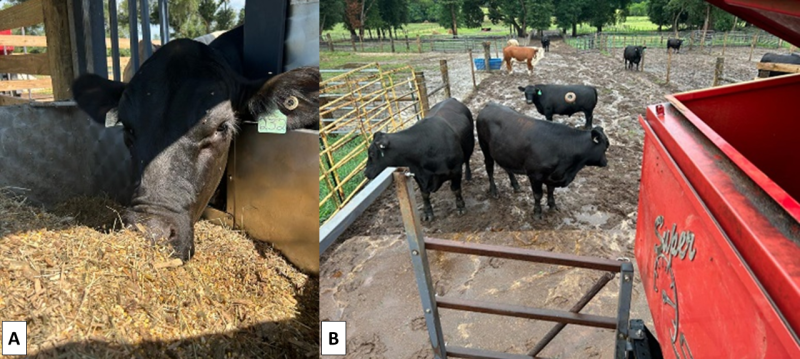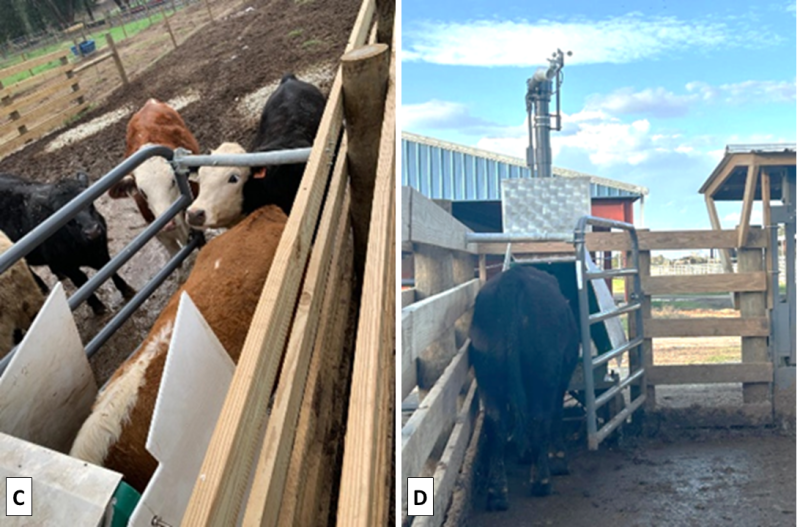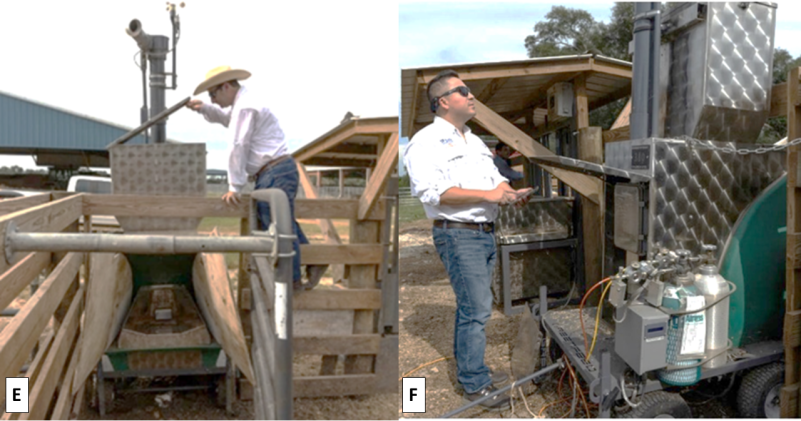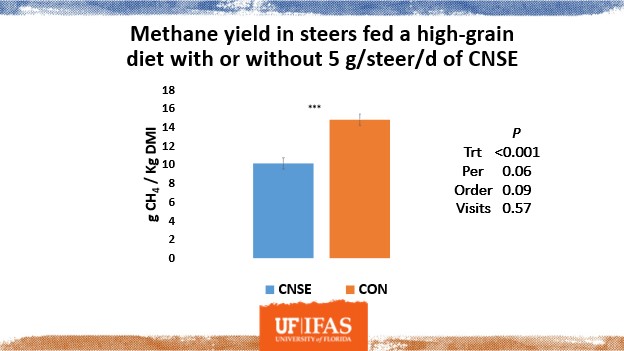Wilmer Cuervo and Nicolas DiLorenzo, North Florida Research and Education Center – Marianna
Beef Cattle Methane Emissions
In today’s dynamic agricultural landscape, cattle ranchers face a central challenge: how to meet the ever-increasing global demand for beef while minimizing its environmental footprint. Methane emissions, resulting from the digestion of feedstuffs (typically called enteric emissions), are a significant negative side effect of beef cattle production. The development of strategies to decrease methane emissions are at the top of the priority list for many scientists around the world. In the U.S. in particular, methane emissions from beef cattle are the largest source of enteric methane. To put it in context, scientists from the USDA have calculated that the carbon footprint of producing one pound of beef carcass weight is equivalent to that of driving a car for 24 miles. Tackling the issue of emissions from livestock operations is imperative for the long-term sustainability of the beef industry.
–

Figure 1 A) Crossbred steer consuming the basal diet delivered as a total mixed ration (TMR). B) Supplement delivered through the Super SmartFeed system (C-Lock). Credit: Wilmer Cuervo, UF/IFAS
–
Researchers at the University of Florida’s, North Florida Research and Education Center (NFREC) have been working on strategies to develop feed additives with potential to mitigate methane emissions, and hopefully enhance cattle growth and performance. One of the promising alternatives for addressing this challenge is the use of Cashew Nutshell Extract (CNSE) as a novel feed additive for use feeding beef cattle.

Figure 2 (C&D) Steers entering the GreenFeed system (C-Lock) to receive bait while measuring their CH4 emissions. Credit: Wilmer Cuervo, UF/IFAS
–
The Potential of CNSE in Methane Mitigation
Cashew Nutshell Extract (CNSE) contains bioactive compounds such as anacardic acid, cardanol, and cardol, which have demonstrated to have potential in mitigating methane production in ruminants. These compounds act by inhibiting the expression of methanogenesis-related genes and altering ruminal fermentation dynamics. This leads to a reduction in methane emissions while promoting the production of propionic acid, a beneficial volatile fatty acid in terms of animal productivity. Based on preliminary research conducted at NFREC, it appears that CNSE can mitigate emissions without compromising diet intake, nutrient digestibility, or overall animal health. However, these results seem to be diet-dependent, based on a series of studies completed by Wilmer Cuervo, PhD student , UF Department of Animal Sciences, who conducted his research at NFREC. Wilmer fed CNSE in either grower rations for backgrounding cattle, or finishing beef cattle diets and measured enteric methane using a device called GreenFeed (Figure 3). Cattle approach the GreenFeed device and a “treat” or bait (pelleted corn gluten feed) is fed. Methane is measured while the animal is eating and belching into the sensor of the machine. This state-of-the-art technology allows the continuous and individual measurements of methane in cattle housed in a pen.

Figure 3. E) Nicolas DiLorenzo and F) Wilmer Cuervo checking the Greenfeed system at the NFREC research facilities. Credit: Wilmer Cuervo, UF/IFAS
–
Take Home Message
A series of preliminary studies conducted on beef cattle at UF-NFREC showed that feeding cashew nutshell extract to steers consuming a high-grain diet reduced methane emissions. Figure 4 (below) shows the results of feeding five grams per kilogram of CNSE/animal/day to steers on a finishing feedlot diet, where a reduction of 31% in methane emissions yield was observed. Given these promising initial results, more studies are planned to assess the potential of this technology in animal health and performance. Further research should be conducted to confirm the current findings and the potential benefits of CNSE in backgrounding diets, while its addition to high-grain diets appears to be a valuable tool for sustainable beef production. Next studies will be focusing on animal productivity when CNSE is included as a novel additive. Continuous research and adoption of this and similar additives may help to pave the way to a more resilient and sustainable beef industry.

Figure 4. Methane emissions from steers fed Cashew Nutshell Extract (CNSE blue) 31% lower than the control (orange), at NFREC Beef Unit – Marianna, FL
- 2025 Florida Bull Test Sale Sets Average Price Record - March 7, 2025
- 2025 Florida Bull Test Sale – January 18 - January 10, 2025
- Intake Limiters:Old Technology for Modern Beef Cattle Supplementation - September 20, 2024
